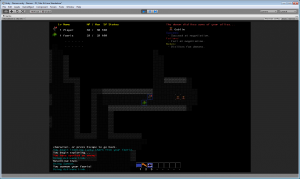There’s a few principles guiding Demon’s development that I think of a philosophy. I’m going to ramble a little about one of them today, namely: challenge should not derive from ignorance, but rather from attempting to choose the correct responses to a given encounter for which all the relevant information is available.
So: why?
I find ignorance-as-challenge to be a fairly terrible way to go about encounter design. It is, for me at least, very frustrating to lose a game because of a caveat of the rules or a particular encounter that was not “announced” until you had been defeated by it: consider times when you’ve ever been learning a new board or card game with a friend and tripped over some rule they forgot to mention or that you misunderstood. Even if they’re a good friend and teacher and let you take back the mistake, it still feels crappy. It feels much worse in a computer game when the computer (not being a good friend) doesn’t let you take back the “newb mistake”, and a hundred times worse still in a game like Demon which features permanent death and no reloading of past saved games.
Defeats caused by mistakes of tactics or strategy, on the other hand, feel differently to me. I don’t like losing in general, of course, few do. ![]() But, in these cases, I usually feel like I had a chance (i.e. it felt “fair”), and at least as importantly, I can potentially identify ways to meaningfully improve as a player by analysis of the my plays and the choices I made to find the mistakes. I think these are important factors in helping a player accept defeat, which is definitely going to be important in a game that will likely hand players that fate over and over again, and with the added sting of permanent death to boot.
But, in these cases, I usually feel like I had a chance (i.e. it felt “fair”), and at least as importantly, I can potentially identify ways to meaningfully improve as a player by analysis of the my plays and the choices I made to find the mistakes. I think these are important factors in helping a player accept defeat, which is definitely going to be important in a game that will likely hand players that fate over and over again, and with the added sting of permanent death to boot.
Alright, we’ve got why? So how do you fight it?
The main methods you can use to fight this are: 1) making sure your game provides all the information necessary to play it, and/or 2) giving the player the opportunity to safely learn the information before being truly penalized. The second is a shakier approach, since that “leeway” will often make the encounter unnecessarily easy once the player learns what is required, so I tend to prefer the first method. To a large degree, Demon already meets this goal in its major elements: players have access to wiki-like information to any demon they can see, including stats, resistances, and abilities (including detailed descriptions.)
But, I do still make mistakes on this point regardless. It’s difficult to pretend ignorance about my own game, which leads to things like the recently added negotiation mechanic where a monster will demand you discard all monsters of certain types (such as undead, demonic) without giving you the chance to spend their training points. A player who knows this is going to happen would of course spend the training points before beginning the negotiation. A player who is unaware this will happen will walk in and suddenly be faced with either failing the negotiation by refusing, or giving up the opportunity to spend training points by accepting, and their only mistake was not knowing something the game made no effort to tell them. This can be highly frustrating, particularly if you *would* be willing to give up the monsters had you spent their training points first, in which case the game’s failure to provide this vital information up front has caused you harm through no fault of your own.
The next version of Demon will fix this problem, by making having no monsters of “bad” types a pre-req for even beginning a negotiation with monsters who care about such things: it will not be possible to even initiate the attempt without manually discarding the “bad” allies (which of course means you have plenty of opportunity to spend their training points as you like.)
With this change, the information is now being provided up front: the player knows exactly what the stakes and rules are. Mistakes can certainly still occur (wouldn’t be much of a game otherwise ![]() ), but they will now be mistakes in the player’s decision making processes: mistakes that the player can accept and learn from.
), but they will now be mistakes in the player’s decision making processes: mistakes that the player can accept and learn from.
P.S.: The next version, btw, will also have a greatly expanded collection of consumable items. More on those with the new version announcement post!
